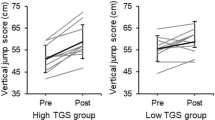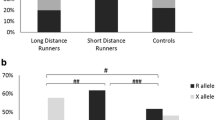Abstract
Purpose
The aim of this study was to investigate the prevalence of the ACTN3 rs1815739 polymorphism and to study its association with athletes’ level of competition and lower-extremity power.
Method
Time-of-flight mass spectrometry (TOFMS) and polymerase chain reaction-restriction fragment length polymorphism (PCR-RFLP) techniques were employed to identify the ACTN3 rs1815739 genotypes and allele frequencies in 108 elite sprinters and 206 untrained controls. Questionnaires were then used to assess subjects’ 100 m sprint, standing jump (SJ) and standing triple jump (STJ) personal best record.
Results
(1) The RR, RX and XX genotype distribution of the ACTN3 rs1815739 polymorphism is 42.6%, 49.1%, 8.3%, respectively. R and X alleles frequency is 67.1% and 32.9%, respectively, which comply with Hardy Weinberg equilibrium (HWE) through Chi-square (χ2) tests (χ2 = 0.661; df = 2; P = 0.718). (2) Significant differences were found in R allele frequency between the elite sprinter group and controls. (3) The athletes’ 100 m sprint, SJ, and STJ personal best records were better in those with RR and RX than XX genotype. A significant association was observed between the R alleles and 100 m sprint, SJ, and STJ results of male and female athletes.
Conclusion
The present results indicate that ACTN3 rs1815739 polymorphism has a significant association with speed and lower-extremity power in sprint/power athletes.



Similar content being viewed by others
References
Clarkson PM, Devaney JM, Gordish-Dressman H, Thompson PD, Hubal MJ, Urso M, Pescatello LS. ACTN3 genotype is associated with increases in muscle strength in response to resistance training in women. J Appl Physiol. 2005;99(1):154–63.
Delmonico MJ, Kostek MC, Doldo NA, Hand BD, Walsh S, Conway JM, Hurley BF. Alpha-actinin-3 (ACTN3) R577X polymorphism influences knee extensor peak power response to strength training in older men and women. J Gerontol Ser A Biol Sci Med Sci. 2007;62(2):206–12.
Eynon N, Duarte JA, Oliveira J, Sagiv M, Yamin C, Meckel Y, Goldhammer E. ACTN3 R577X polymorphism and Israeli top-level athletes. Int J Sports Med. 2009;30(09):695–8.
Henesy MB, Britain AL, Zhu B, Amable L, Honkanen RE, Corbin JD, Rich TA. Calcineurin regulates homologous desensitization of natriuretic peptide receptor-A and inhibits ANP-induced testosterone production in MA-10 cells. PLoS ONE. 2012;7(8):e41711.
Kuo P, Chang Z. Study of ACTN3 polymorphism on athletic abilities and talent identification. J Northwest Univ (Nat Sci Ed). 2015;45(4):602–5.
Li CY, Wang LC, Yi LY, Hu Y. Association between ACTN3 R577X polymorphism and athletic abilities in long-distanced swimmers’. China Sport Sci Technol. 2016;52(1):136–40.
MacArthur DG, North KN. A gene for speed? The evolution and function of α- actinin-3. BioEssays. 2004;26(7):786–95.
Massidda M, Vona G, Calo CM. Association between the ACTN3 R577X polymorphism and artistic gymnastic performance in Italy. Genet Test Mol Biomark. 2009;13(3):377–80.
Mikami E, Fuku N, Murakami H, Tsuchie H, Takahashi H, Ohiwa N, Kawahara T. ACTN3 R577X genotype is associated with sprinting in elite Japanese athletes. Int J Sports Med. 2014;35(02):172–7.
Mills M, Yang N, Weinberger R, Vander Woude DL, Beggs AH, Easteal S, North K. Differential expression of the actin-binding proteins, α-actinin-2 and -3, in different species: implications for the evolution of functional redundancy. Hum Mol Genet. 2001;10(13):1335–466.
Moran CN, Yang N, Bailey ME, Tsiokanos A, Jamurtas A, MacArthur DG, Wilson RH. Association analysis of the ACTN3 R577X polymorphism and complex quantitative body composition and performance phenotypes in adolescent Greeks. Eur J Hum Genet. 2007;15(1):88.
Niemi AK, Majamaa K. Mitochondrial DNA and ACTN3 genotypes in Finnish elite endurance and sprint athletes. Eur J Hum Genet. 2005;13(8):965.
North KN, Yang N, Wattanasirichaigoon D, Mills M, Easteal S, Beggs AH. A common nonsense mutation results in α-actinin-3 deficiency in the general population. Nat Genet. 1999;21(4):353.
Orysiak J, Busko K, Michalski R, Mazur-Różycka J, Gajewski J, Malczewska-Lenczowska J, Pokrywka A. Relationship between ACTN3 R577X polymorphism and maximal power output in elite Polish athletes. Medicina. 2014;50(5):303–8.
Papadimitriou ID, Papadopoulos C, Kouvatsi A, Triantaphyllidis C. The ACTN3 gene in elite Greek track and field athletes. Int J Sports Med. 2008;29(04):352–5.
Rodríguez-Romo G, Ruiz JR, Santiago C, Fiuza-Luces C, González-Freire M, Gómez-Gallego F, Lucia A. Does the ACE I/D polymorphism, alone or in combination with the ACTN3 R577X polymorphism, influence muscle power phenotypes in young, non-athletic adults? Eur J Appl Physiol. 2010;110(6):1099–106.
Ruiz JR, Fernández del Valle M, Verde Z, Díez-Vega I, Santiago C, Yvert T, Lucia B. ACTN3 R577X polymorphism does not influence explosive leg muscle power in elite volleyball players. Scand J Med Sci Sports. 2011;21(6):e34–e41.
Scott RA, Irving R, Irwin L, Morrison E, Charlton V, Austin K, Yang N. ACTN3 and ACE genotypes in elite Jamaican and US sprinters. Med Sci Sports Exerc. 2010;42(1):107–12.
Vincent B, De Bock K, Ramaekers M, Van den Eede E, Van Leemputte M, Hespel P, Thomis MA. ACTN3 (R577X) genotype is associated with fiber type distribution. Physiol Genom. 2007;32(1):58–63.
Walsh S, Liu D, Metter EJ, Ferrucci L, Roth SM. ACTN3 genotype is associated with muscle phenotypes in women across the adult age span. J Appl Physiol. 2008;105(5):1486–91.
Yang H, Hu Y, Li Y, Wei YS. Feasibility study of ACTN3 C1747T polymorphism on talent identification in weightlifters. China Sport Sci. 2010;30(1):70–3.
Yang HK, Li YC, Hu Y. Association between ACTN3 R577X polymorphism and athletic abilities: a meta-analysis. China Sport Sci. 2011;31(3):44–52.
Yang N, MacArthur DG, Gulbin JP, Hahn AG, Beggs AH, Easteal S, North K. ACTN3 genotype is associated with human elite athletic performance. Am J Hum Genet. 2003;73(3):627–31.
Yang R. The research on gene polymorphisms related to power performance and predictive model in Chinese elite athletes (Doctoral dissertation). Shanghai University of Sport. 2017.
Yang R, Shen X, Wang Y, Voisin S, Cai G, Fu Y, Yan X. ACTN3 R577X gene variant is associated with muscle-related phenotypes in elite Chinese sprint/power athletes. J Strength Cond Res. 2017;31(4):1107–15.
Acknowledgements
We thank Bei**g Sport University reseach labs for the help with experimental data collection and the financial support from Fundamental Research Funds for the Central Universities.
Funding
This work was supported by Fundamental Research Funds for the Central Universities under Grant 2017SYS001.
Author information
Authors and Affiliations
Corresponding author
Ethics declarations
Conflict of interest
We declare that we have no financial and personal relationships with other people or organizations that can inappropriately influence our work, there is no professional or other personal interest of any nature or kind in any product, service and/or company that could be construed as influencing the position presented in, or the review of, the manuscript entitled.
Rights and permissions
About this article
Cite this article
Chen, W., Zhang, B., Li, Y. et al. Association Between rs1815739 Polymorphism of ACTN3 Gene and Athletic Ability in Chinese Sprinters. J. of SCI. IN SPORT AND EXERCISE 2, 113–119 (2020). https://doi.org/10.1007/s42978-020-00058-1
Received:
Accepted:
Published:
Issue Date:
DOI: https://doi.org/10.1007/s42978-020-00058-1




